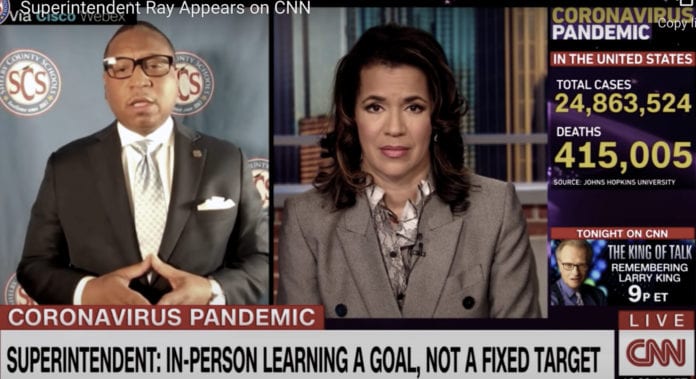by Curtis Weathers —
First, let me congratulate Tennessee legislators for the hard work they did last week in a special session that produced desperately needed support for our students and teachers in the battle against the coronavirus pandemic.
In addition to providing financial support for some vitally needed interventions for Tennessee students, they also passed legislation that would provide a four percent increase in teacher salaries.
The bills they passed will provide funding to help mitigate learning loss caused by the pandemic, support efforts to improve reading proficiency and roll back accountability measures related to state testing issues impacted by COVID-19.
But, it is what they tried and failed to do that really caught my attention.
The governor and 28 house republicans, none of whom represent Shelby County, tried to push through a bill that threatens to pull state funding from school districts if they do not offer an in-person learning option to students for at least 70 days this school year. The bill was not voted on last week, but will likely be addressed before the end of the regula legislative session.
House Bill 7021 reads as follows:
“As introduced, requires LEAs serving any of the grades K-8 to provide in-person instruction for students for a minimum of 70 days in the 2020-2021 school year by June 30, 2021, and the full 180 days in the 2021-2022 school year; the commissioner of education may withhold all or part of an LEAs BEP funding, if the LEA fails to comply with the in-person instruction requirements.”
I was appalled.
As conditions currently stand, this legislation would only apply to the two largest school systems in the state, Shelby County Schools and Metro Nashville Public Schools.
Shelby County Schools, the largest district in the state, has been virtual all year while Metro Nashville Schools, the second-largest district, have had some in-person learning but mostly has been virtual.
If I recall, school systems in Tennessee were given the authority and autonomy to manage their response to the pandemic in a manner that best addressed conditions on the ground in their respective communities.
Leaders in these school systems are trying their best to make data-driven, science-based decisions to protect the health and wellbeing of their employees and their community.
It is outrageous for state legislators to put this kind of pressure on them.
In his latest coronavirus video update, SCS Superintendent Joris Ray pleaded with Gov. Lee and lawmakers to “please don’t hurt my children.”
Lee, in response, said, “I believe in local decision-making. Nevertheless, I wish the children in Shelby County were in person in classrooms in a greater way than they are today.”
Shelby County Schools already have plans to return to in-person learning in early February, but only if the spread of the virus is in significant decline.
Ray, however, has made it crystal clear to everyone that his main priority is the health and safety of students, teachers and staff.
Leaders of the district’s two teacher unions have applauded Ray’s management of the pandemic and have supported his decision to remain virtual.
“People are afraid of this virus,” said Danette Stokes, the president of the United Education Association of Shelby County. “But like most people, the concern is, ‘I can’t put my family in a situation to be exposed to coronavirus because I’m at work.’ And apparently, parents are feeling the same way.”
A districtwide survey of parents and teachers released last month showed little appetite for returning to in-person learning.
In fact, 70 percent of parents and over 80 ppecent of teachers preferred the virtual option, and less than a third of SCS students were expected to return for in-person learning when it starts (if it starts) in February.
We all want our students back in school. That is not a debatable issue. But the metrics regarding community spread of the virus in these two districts do not support returning to in-person learning anytime soon.
To punish school systems because they are doing their best to follow the science and make responsible decisions is counterproductive.
Tennessee legislators should ask themselves one particularly important question: What is most important, learning loss or loss of lives?
New data suggests learning loss among students in Memphis may not be as bad as initially predicted. The legislature approved funding for several programs to address learning loss and reading proficiency for students throughout the entire state.
While it is possible to successfully address loss of learning, it is impossible to address the loss of life.
For the governor and some legislators to suggest that leaders in Memphis are somehow taking the easy way out is a slap in the face to the hard-working teachers, support staff, parents and students of this great community.

It would serve the governor well to sit down with leaders from each of these communities and get a better sense of the problems and challenges they are facing. He just might come away with a better understanding of their concerns and perhaps even discover a better way to achieve his goals, whatever they might be.
So, thank you Shelby County Schools Superintendent Joris Ray and Nashville Metro Schools Superintendent Adrienne Battle, for being responsible leaders of your districts and following the science, not the governor.
(Follow TSD education columnist Curtis Weathers on Twitter (@curtisweathers); email: curtislweathers@gmail.com.)




